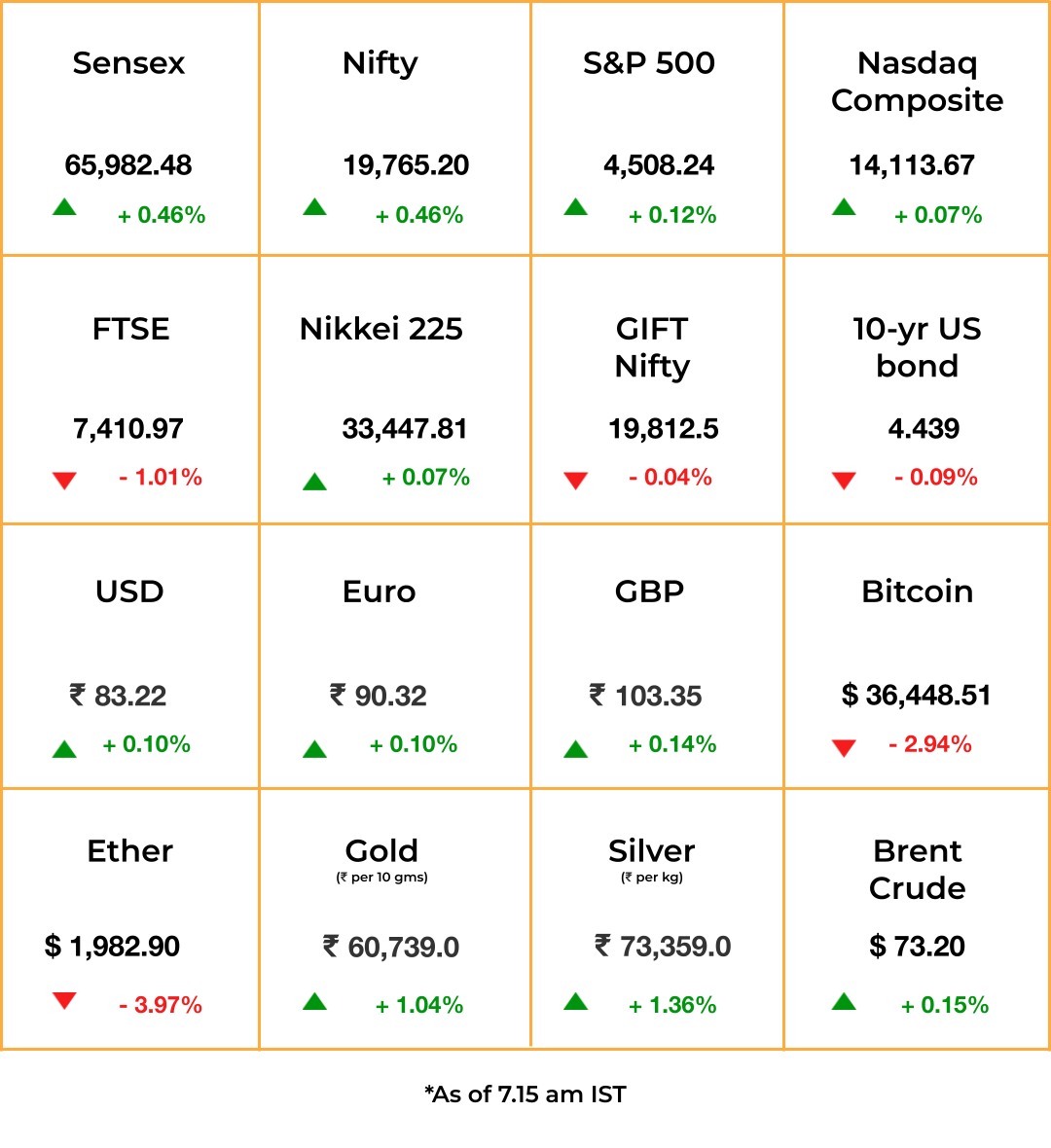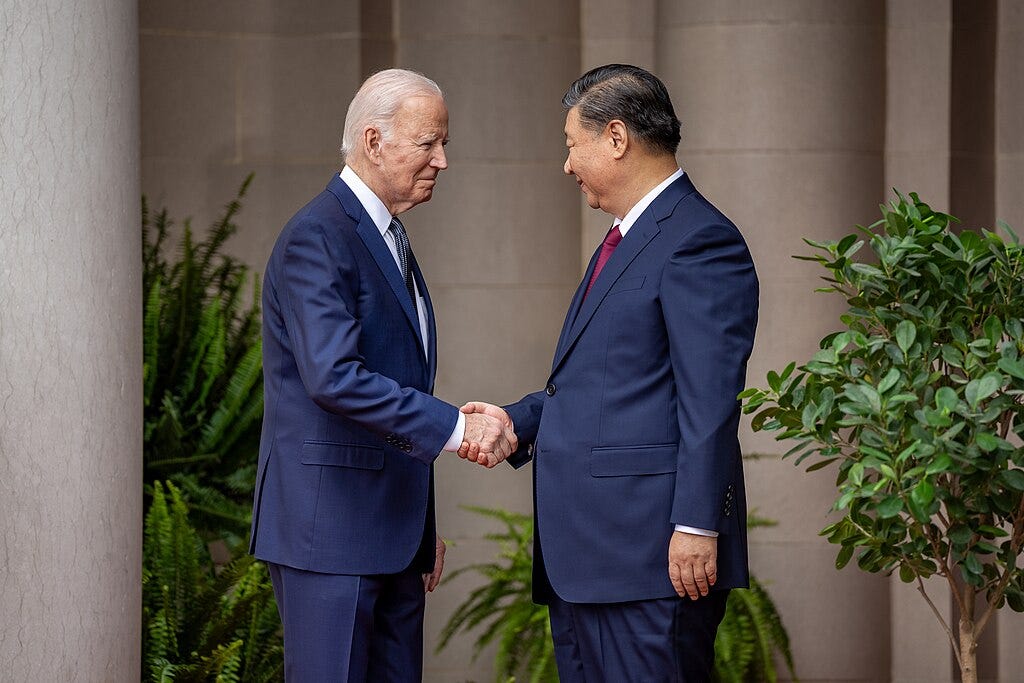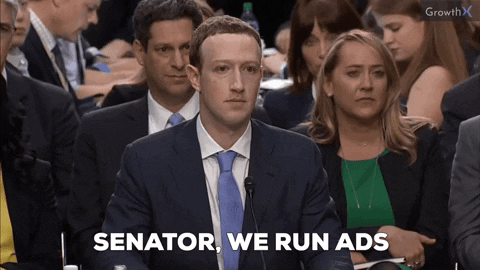A takeover as sticky as honey
Also in today’s edition: Subrata Roy’s controversial legacy; Xi-Biden make amends; Microsoft stacks the deck; Meta goes the chequered mile for ad $$$
Good morning! No one likes to be reminded of their age. The latest example of that is grandparents in the US, who are shying away from being called grandpa/ma as they deem it too old. The Wall Street Journal reports that these grandparents are instead going by a range of names—from whimsical ones like Papa John to outright absurd ones like Grandsire The Magnificent. Some, however, are sticking with traditional familial labels and are instead choosing to fight ageism. Ah well, the circle of life moves us all.
Roshni Nair and Adarsh Singh also contributed to today’s edition.
We would like to know more about you. Participate in our annual survey by filling up this form. We’ll use your answers to tweak our products and make them more enjoyable for you. As always: you will remain anonymous.
The Market Signal
Stocks & Economy: Brent crude prices plunged nearly 4.6% to below $78 a barrel as US stockpiles rose and data showed the US economy was slowing. The labour department reported that jobless claims rose for the eighth straight week. Data released earlier in the week indicated that demand for goods as well as factory output was falling.
Asian markets were mixed in early trade, with Japanese stocks trading in positive territory while the rest of the region was marginally in the red.
The GIFT Nifty’s morning movement indicates a positive opening for Indian equities. Moneycontrol reports that Japanese investor SoftBank is likely to sell logistics firm Delhivery’s shares worth $150 million in a block deal.
Meanwhile, markets regulator Sebi will likely change norms for taking companies private. The Sebi board will consider moving to a fixed price mechanism instead of the current reverse book building route to delist companies.
CORPORATE
Deals Need ‘Care’
The Burmans and Religare are learning this the hard way: through a very public mud-slinging battle.
Recap: The Burman family is attempting to take over financial services firm Religare Enterprises. It has been funding the firm, including insurance business Care, through a recovery from its scandal-hit founders Malvinder and Shivinder Singh.
The Burmans say Religare’s management, including executive chairperson Rashmi Saluja, rebuffed their offer after initially welcoming it. Now, allegations are flying thick and fast.
Dirty laundry: Advisory firm InGovern alleged Dr Saluja received a promotion and pay hike without shareholder and regulatory approvals. The Burmans also alleged she sold part of her personal stake in Religare after initial discussions of a Burman takeover.
Religare accused the Burmans of financial fraud, and Mohit and Gaurav Burman are named in an FIR against the illegal betting app Mahadev; the Burmans say it is an attempt to scuttle the takeover.
CORPORATE
Pariwar Loses Patriarch
‘Saharasri’ Subrata Roy, founder of the Sahara Group, passed away in Mumbai this week after a long illness. He was 75. Roy, who kept the company of film stars, politicians, and cricketers alike, was among Uttar Pradesh’s most successful businessmen. The Lucknow-headquartered Sahara India Pariwar, once India’s second largest employer, cultivated a patriotic image. Its interests spanned real estate (including, at one time, New York City’s Plaza Hotel and London’s Grosvenor House), media, and finance.
Ponzi problems: It was finance that took Roy down. Accused of running Ponzi schemes and defrauding poor and working-class investors in Uttar Pradesh, Roy served time in Delhi’s Tihar Jail. But the more than ₹25,000 crore (~$3 billion) of Sahara’s refund deposit with market regulator Sebi is yet to reach its victims. Sebi says most Sahara scheme investors haven’t made claims yet, and many of those who applied aren’t in Sahara Group records.
🎧 The making and unmaking of Sahara’s Subrata Roy. Listen to The Signal Daily on Spotify, Apple Podcasts, Amazon Music, Google Podcasts, or wherever you get your podcasts.
GEOPOLITICS
Thaw At Last
Four hours. That’s how long US President Joe Biden and Chinese President Xi Jinping talked when they met in San Francisco on Wednesday.
What they decided: They chatted about fentanyl. Xi agreed to crack down on the ingredients for the synthetic opioid that kills 150 Americans daily. They resolved to resume communications between the militaries of the two nations. Above all, Biden and Xi promised to not ghost one another on the phone.
The elephant in the room clearly was Taiwan. Xi warned Biden not to arm the island, which was destined to be merged with China.
Panda diplomacy: And yes, Xi will send a pair of pandas, the black and white US-China friendship ambassadors since 1972, as a goodwill gesture.
Xi later met with top US business leaders, including BlackRock chief Larry Fink, Bridgewater Associates’ Ray Dalio, and Blackstone’s Stephen Schwarzman.
The Signal
Xi correctly called the US-China relationship the most important one in the world. A thaw between Washington and Beijing will be the best thing to happen to a planet riven with conflict. Yet, despite the sensitivities involved, Biden called Xi a dictator, “in the sense that he is a guy who runs a country that is a Communist country”. It is yet unclear whether Xi, who came looking for respect, will let the off-the-cuff remark pass.
Wall Street will certainly hope so. Trillions of dollars are searching for investable assets. China’s doddering economy wouldn’t mind laying hands on some of it.
ARTIFICIAL INTELLIGENCE
Stacking Up
In a move reminiscent of Apple developing chips for the iPhone and Mac, Microsoft unveiled its custom processors for AI and the cloud: Maia and Cobalt. It’s an attempt to reduce dependence on suppliers such as Nvidia, which recently breached the trillion-dollar market cap thanks to its near-monopoly on the advanced graphics processing units required to train and run AI models. Microsoft, though, maintains it will continue partnerships with Nvidia (and AMD) for its cloud service, Azure.
Microsoft’s AI and cloud competitors Google and Amazon are also developing full stacks. Custom silicon is mighty expensive, but the bet is that integrating hardware and software will boost efficiencies and reduce costs in the long run.
In other news: Microsoft also launched a deepfake creator 👀, a16z has invested in a generative AI startup with a problematic track record, and Google DeepMind’s GraphCast AI model is outperforming conventional weather forecasting tools.
SOCIAL MEDIA
Now Selling: Elections!
Get ready for another wild election season. Meta will allow political ads on Facebook and Instagram that question the legitimacy of the 2020 US presidential election. Executives cited (no prizes for guessing) free speech considerations for this decision.
This much goes against Meta’s earlier changes to the Facebook feed, which wouldn’t show users several posts about politics in a row. It would force politicians relying on organic social media exposure to opt for ads on Meta’s services.
Meanwhile: After sidelining minors’ online safety, Meta’s now looking to pass the buck on age vetting to app stores of Google and Apple.
Additionally: As Zuckerberg’s metaverse ambitions falter, Meta has hailed messaging as its “next chapter”. The company is shifting focus to monetising WhatsApp and further developing Threads.
In other news: Social media startup IRL, which shut down, has accused SoftBank of destroying the company in order to protect its own reputation.
FYI
No, can’t do: The government has told billionaire Anil Agarwal’s Hindustan Zinc that it cannot reorganise its business without its prior clearance. The government owns ~30% in the company.
Race on: Conglomerates led by billionaires Lakshmi Mittal, Gautam Adani, and Sajjan Jindal are in the race to buy Kutch-based Vadraj Cement from bankrupt group ABG Shipyard.
Hold your breath: The Delhi government has instituted a special task force to implement GRAP Stage 4—emergency measures to prevent further air pollution—after the National Capital Region’s AQI deteriorated to 386 on Thursday.
Reining it in: The Reserve Bank of India has tightened consumer loan norms for banks and NBFCs; the development comes in the wake of Indian household savings reaching a 16-year low in September.
Pulled up: The US has launched a criminal probe against semiconductor equipment maker Applied Materials for possibly evading export sanctions on Chinese chipmaker SMIC, Reuters reports.
The everything store: Amazon will sell Hyundai vehicles online starting in 2024; delivery will be fulfilled by Hyundai dealerships.
Sweet stuff: American candy giant Mars has agreed to acquire Hotel Chocolat Group for $662 million—a 170% premium above the British high-end chocolatier’s share price.
THE DAILY DIGIT
53 million
The peak concurrency (number of viewers watching simultaneously) recorded by Disney+ Hotstar during the India-New Zealand World Cup semi-final on Wednesday. It beat the streaming platform’s past record of 44 million set during the India-South Africa match. Expect this record to be broken (again) during the final on Sunday. (Business Standard)
FWIW
Great expectations: You work for a grumpy, rich old man but you eventually become friends. On his deathbed, he bequeaths a rare artefact to you. Sounds like your typical Hollywood flick, right? Well, for Mark Herman, this was reality. A dog walker by profession, Mark was left a Chuck Close painting by his employee-cum-friend, Isidore Silver. Those paintings sell for millions of dollars, but red-tape ensured Mark couldn’t sell it instantly. After much back and forth, the painting did sell, but only for a mere $40,000. Hard luck indeed.
Inked forever: Never turn a fad into a tattoo. That’s what people are learning the hard way. During Covid, many people opted to get a Spotify barcode of their favourite song inked on their body. But now, these barcodes aren’t working for everyone. In some cases, the ink has faded while in others, the barcode lines have thickened, making scanning difficult. Some are taking a rather philosophical approach to this though. Instead of getting these tattoos redone, they see it as a time capsule reminding them of the past. Wholesome! ✨
Nightmare house: What goes around comes around. Unfortunately for Shai Gilgeous-Alexander, it’s not working exactly like that. The star basketball player for Oklahoma City Thunder has had to reap the ills of someone else’s bad karma. After buying a $6.1 million house in Lake Ontario, Shai faced a regular stream of angry visitors at his new house. Why? Because of the former owner, Aiden Pleterski, a self-styled crypto king who owes millions of dollars to investors. Shai has now filed a lawsuit seeking to nullify the sale for withholding crucial information. Sigh… sometimes karma doesn’t play fair.










Good One, But better to mention reading time as well. Sometimes feels too long.